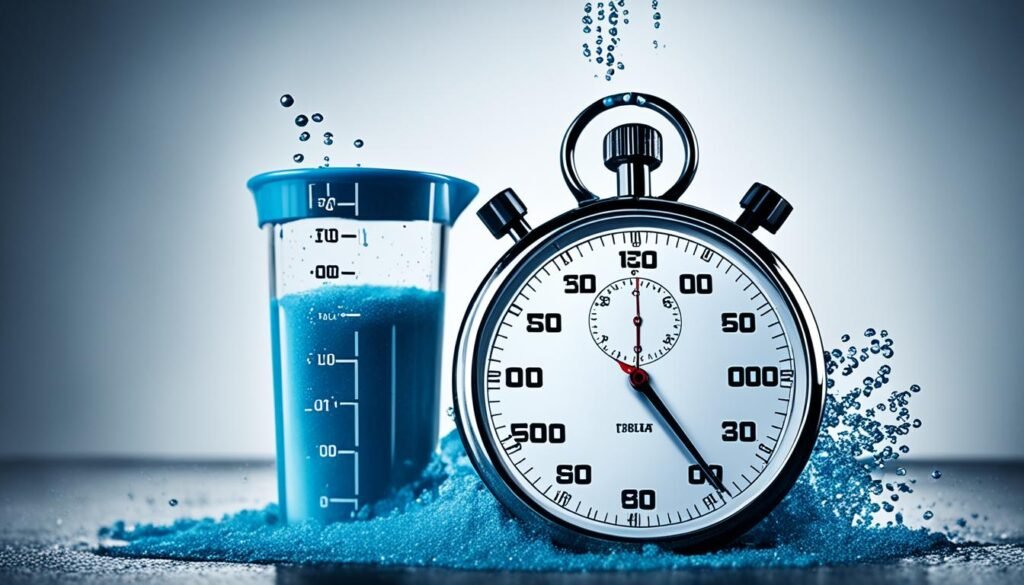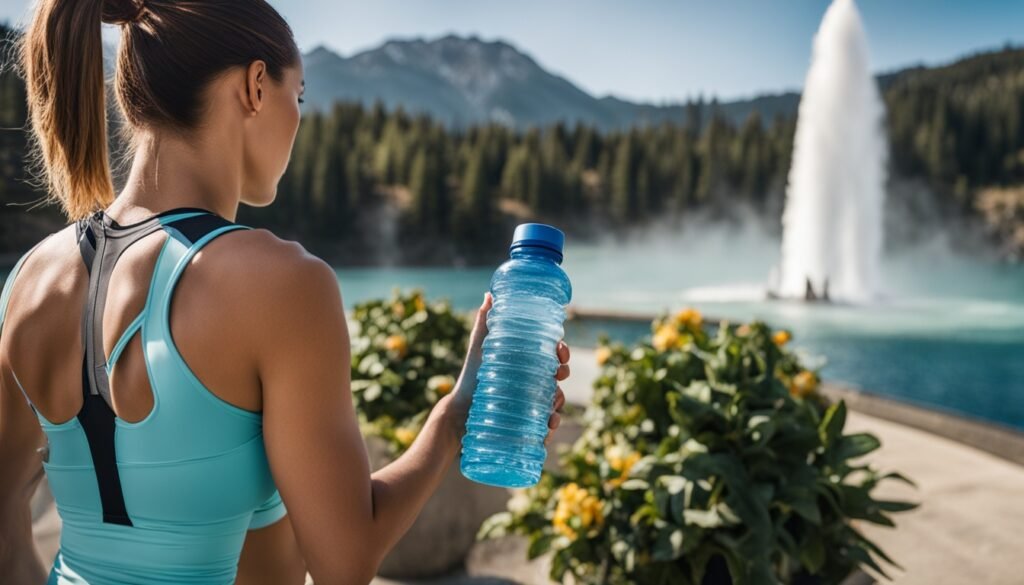For athletes, staying hydrated is key to top performance and avoiding dehydration’s bad effects. This guide will cover hydration strategies for athletes to boost your performance and keep you fueled during training and competitions.
Learn how to figure out your sweat rate and replenish important electrolytes. You’ll get science-backed tips on when to drink fluids and how to check if you’re hydrated. These hydration strategies are great for all athletes, whether you’re into endurance sports or power sports. They’ll help you do your best, even when it’s tough.
Table of Contents
ToggleKey Takeaways
- Proper hydration is crucial for athletic performance and preventing dehydration.
- Calculating your individual sweat rate helps guide your personalized hydration plan.
- Replenishing electrolytes, like sodium and potassium, is essential for maintaining fluid balance.
- Timing your fluid intake before, during, and after exercise is key to staying hydrated.
- Monitoring hydration status through urine color and body weight changes can help you stay on track.
The Importance of Proper Hydration
Drinking enough water is key for athletes and staying healthy. Not drinking enough water can lead to serious problems. These include issues with thermoregulation, less blood, and not enough electrolytes. These problems can make athletes tired, weaker, and more likely to get sick from the heat.
Physiological Effects of Dehydration
Being dehydrated can cause many health problems, such as:
- Less blood to carry oxygen and nutrients to muscles
- Electrolyte imbalance, causing muscle cramps and other issues
- Harder for the body to control its temperature when exercising
Impact on Athletic Performance
Dehydration can really hurt how well athletes perform. It can make them:
- Run out of energy faster
- Have less strength and power
- Feel like they’re working harder than they should
- Be more likely to get sick from the heat
“Proper hydration is essential for maintaining optimal physical and cognitive function during exercise.”
To avoid the bad effects of dehydration, athletes need good ways to stay hydrated. This helps them perform their best.
| Physiological Effect | Impact on Athletic Performance |
|---|---|
| Decreased blood volume | Impaired oxygen and nutrient delivery to working muscles |
| Electrolyte imbalance | Muscle cramps and other complications |
| Impaired thermoregulation | Increased risk of heat-related illnesses |

Knowing how important it is to stay hydrated helps athletes get ready. They can avoid dehydration and do their best in training and competitions.
Calculating Your Sweat Rate
Finding out how much you sweat is key to making a good hydration plan. By weighing yourself before and after exercise, you can figure out your sweat rate. This helps you understand how much fluid and electrolytes you need.
To find your sweat rate, just follow these easy steps:
- Weigh yourself in light, dry clothes before your workout.
- Do your exercise routine as usual, without drinking any fluids during it.
- Weigh yourself right after your workout, wearing the same clothes as before.
- Find the difference in your pre- and post-workout weights, minus any fluids you drank or urine you made during exercise.
- Divide the weight difference by how long your workout lasted in hours to get your Sweat Rate Calculation.
Let’s say your pre-workout weight was 150 pounds and your post-workout weight was 147 pounds. If you didn’t drink any fluids or make urine, your sweat rate would be 3 pounds per hour. This info helps you make a hydration plan that replaces the fluids and electrolytes you lose when you work out.
| Pre-Workout Weight | Post-Workout Weight | Sweat Rate |
|---|---|---|
| 150 pounds | 147 pounds | 3 pounds per hour |

“Knowing your sweat rate is the key to optimizing your hydration strategy and ensuring peak athletic performance.”
By regularly checking your Sweat Rate Calculation, you can adjust your hydration plan. This makes sure you’re replacing the fluids and electrolytes you lose during workouts. It helps you reach your athletic goals and stay healthy.
Hydration Strategies for Athletes
For athletes, staying hydrated is key to top performance and avoiding dehydration’s bad effects. Using good hydration plans before, during, and after exercise keeps athletes fueled. This helps them do their best in training and competitions.
Pre-Exercise Hydration
Getting ready for exercise starts with drinking enough water hours before. Experts say to drink fluids slowly before a workout or event. This makes sure the body has enough water for the activity ahead.
During Exercise Hydration
It’s important to keep drinking fluids while exercising to Dehydration Prevention. Athletes should drink fluids every 15-20 minutes to replace lost water. The best time to drink depends on how long and hard you’re exercising, and the weather.
To avoid dehydration, athletes should make a hydration plan that fits their sweat rate and water needs. Watching your body weight, urine color, and other signs can help. This ensures you stay hydrated during training and competitions.
“Staying hydrated is a game-changer for athletes. It can mean the difference between a personal best and falling short of your goals.”
Good pre-exercise and during-exercise hydration helps athletes perform better, recover faster, and stay healthy. Paying attention to Fluid Intake Timing and Dehydration Prevention is crucial. It keeps athletes hydrated and helps them succeed.
Electrolyte Replenishment
During intense exercise, athletes lose a lot of electrolytes like sodium, potassium, and chloride through sweat. It’s key to get these minerals back to keep fluids balanced, muscles working right, and performance up. Adding foods and drinks full of electrolytes to your hydration plan helps you stay fueled and perform well.
Types of Electrolytes
The main electrolytes athletes need to replace are:
- Sodium: Helps regulate fluid balance and muscle function
- Potassium: Supports muscle contractions and nerve function
- Chloride: Assists in maintaining fluid balance and pH levels
Electrolyte-Rich Foods and Beverages
To get back electrolytes, add these to your diet:
- Sports drinks: Made to give a balanced mix of electrolytes and carbs
- Coconut water: A natural source of potassium, with some sodium too
- Bananas: High in potassium, important for muscles
- Leafy greens: Full of electrolytes like magnesium and calcium
- Nuts and seeds: Give electrolytes, healthy fats, and protein
By focusing on Electrolyte Replenishment, athletes can make sure their bodies have the right minerals. This helps them perform at their best and recover well from hard training and competition.
Fluid Intake Timing
For athletes, staying hydrated is key to doing well. It’s important to drink fluids at the right times. This helps keep your body from getting too dry and losing performance.
Drinking fluids at the right time has many benefits:
- Keeps hydration levels steady
- Helps avoid dehydration and losing performance
- Boosts endurance and stamina in long workouts
- Helps control body temperature and lowers the chance of heat sickness
Here are tips for the best fluid intake timing:
- Drink small amounts of fluids every 15-20 minutes while exercising
- Drink fluids before, during, and after sports or training
- Adjust how much you drink based on how much you sweat and how long you exercise
- Use drinks with electrolytes to replace lost minerals
By keeping an eye on fluid intake, athletes can make sure they’re well-hydrated. This helps them perform their best.
| Hydration Needs | Fluid Intake Recommendations |
|---|---|
| Short-duration exercise ( | Drink 4-6 oz (120-180 mL) of fluid every 15-20 minutes |
| Prolonged exercise (>1 hour) | Drink 6-8 oz (180-240 mL) of fluid every 15-20 minutes |
| Hot, humid conditions | Increase fluid intake by 25-50% to account for higher sweat rates |
“Proper Fluid Intake Timing is essential for maintaining peak athletic performance and preventing the negative effects of dehydration.”
By following these guidelines, athletes can stay hydrated, full of energy, and ready to perform well in training and competitions.
Hydration Monitoring Techniques
For athletes, keeping an eye on your hydration is key to performing well. Two good ways to check your hydration are by looking at your urine color and tracking your body weight. Urine color analysis and body weight changes are great tools for this.
Urine Color Analysis
Checking your urine color is a simple way to see if you’re hydrated. If it’s light and pale yellow, you’re good. But if it’s dark, you might need more water. This helps you keep your hydration right.
Body Weight Changes
Watching your weight before and after exercise can tell you about your hydration. Losing weight means you’ve lost fluids. By tracking this, you can figure out how much water you need to drink to get back to normal.
| Hydration Monitoring Technique | What It Tells You | How to Implement |
|---|---|---|
| Urine Color Analysis | Hydration status | Check urine color regularly |
| Body Weight Changes | Fluid loss during exercise | Weigh yourself before and after workouts |
Using these Hydration Monitoring methods can help you manage your fluids better. This ensures you’re ready for your best performance.
“Proper hydration is the foundation for peak athletic performance. Regularly monitoring your hydration status can help you make informed adjustments to your hydration strategy.”
Sports Drinks Recommendations
For staying hydrated during exercise, sports drinks are great for athletes. They offer a mix of carbohydrates, electrolytes, and fluids. This helps keep your hydration and energy up during workouts. But, with so many sports drinks out there, picking the right one is key.
Here are some tips to help you choose the best sports drinks for your exercises:
- Choose sports drinks with 6-8 grams of carbohydrates per serving. This keeps your energy steady without overloading.
- Find sports drinks with electrolytes like sodium and potassium to replace what you lose when you sweat.
- Steer clear of sports drinks with lots of sugar. They can make you feel tired and might upset your stomach.
- Think about what you like and any food restrictions you have when picking a sports drink.
By using these sports drinks recommendations, you can make sure you’re getting the right nutrients. This helps you stay hydrated and perform well in your sports.
“Proper hydration is essential for athletes to maintain physical and cognitive performance during exercise.”
It’s important to try different sports drinks to see what works best for you. Experiment and find the one that fits your body and training the best. Stay hydrated, stay energized, and enjoy your sports journey.
Heat Acclimatization Tips
Working out in hot and humid places can be tough. It raises the risk of getting heat-related illnesses like heat exhaustion and heat stroke. But, a good heat acclimatization plan can help your body adjust. This makes you perform better and stay safe in the heat.
Here are some tips to help you get used to the heat:
- Gradually Increase Exposure: Start with short periods in the heat, then slowly increase the time and intensity of your workouts over 7-14 days.
- Hydrate Consistently: Drink plenty of water before, during, and after your workouts to replace lost fluids and electrolytes.
- Monitor Sweat Rate: Keep an eye on how much you sweat and adjust your water intake to avoid dehydration.
- Adapt Training Intensity: Lower the intensity of your workouts at first, then slowly increase it as you get used to the heat.
- Wear Appropriate Clothing: Choose clothes that are light, breathable, and help keep your body cool.
By using these Heat Acclimatization Tips, you can make sure your body is ready for hot and humid workouts. This will improve your performance and keep you safe.
“Proper heat acclimatization is crucial for athletes and fitness enthusiasts to perform at their best and stay safe in hot weather conditions.”
Avoiding Hyponatremia
Hyponatremia is a condition where the sodium levels in the blood drop too low. It’s a big worry for athletes who work out a lot. Keeping the right balance of water and electrolytes is key to stop this serious issue.
Drinking too much water without getting back the lost electrolytes like sodium can cause hyponatremia. This makes the blood’s sodium level drop. It can make athletes feel bad, hurt their performance, and even be dangerous.
Recognizing the Signs of Hyponatremia
Athletes need to know the signs of hyponatremia. These include:
- Nausea and vomiting
- Headache
- Confusion and disorientation
- Fatigue and muscle cramps
- Seizures and coma in severe cases
Strategies to Prevent Hyponatremia
To stop hyponatremia, athletes should:
- Make a hydration plan with water and drinks with electrolytes, like sports drinks or electrolyte tablets.
- Watch how much you sweat and change your fluids and electrolytes as needed.
- Don’t drink too much water when it’s hot and humid.
- Put back what you lose through sweat with a good diet or electrolyte supplements.
- Talk to a doctor or a sports nutritionist to make a plan for your hydration and electrolytes.
Knowing the risks of hyponatremia and using good hydration tips helps athletes stay safe and perform well during hard workouts.
| Electrolyte | Function | Food Sources |
|---|---|---|
| Sodium | Regulates fluid balance, nerve and muscle function | Salts, processed foods, sports drinks |
| Potassium | Helps maintain muscle and nerve function | Bananas, leafy greens, potatoes |
| Calcium | Supports bone health and muscle contraction | Dairy products, leafy greens, fortified foods |
| Magnesium | Involved in energy production and muscle function | Whole grains, nuts, seeds, leafy greens |
“Proper hydration and electrolyte balance are essential for athletes to perform at their best and avoid potentially dangerous conditions like hyponatremia.”
Conclusion
Proper hydration is key for athletes aiming for top performance. This guide has shown you how to keep your body ready for training or competition. By understanding your sweat rate and replenishing electrolytes, you can make a hydration plan that fits you.
Keeping an eye on your hydration helps you stay at your best. It also lowers the risk of dehydration or hyponatremia. This means you can perform better and stay healthy.
Hydration isn’t the same for everyone. Listen to your body and try different ways to stay hydrated. With the right Hydration Strategies for Athletes, you’ll be on your way to achieving your goals.
FAQ
What are the key factors to consider when developing an effective hydration strategy for athletes?
Key factors include figuring out your sweat rate, replacing lost electrolytes, and timing your drinks during exercise. Also, check your hydration status with urine color and body weight changes.
How can athletes calculate their sweat rate?
First, weigh yourself before and after exercise. Subtract any fluid you drank or lost as urine. This shows your sweat rate. It helps you know how much fluid and electrolytes you need.
What are the best ways for athletes to stay hydrated during exercise?
Drink fluids regularly, not all at once. This keeps your hydration steady and prevents sudden drops in performance. Also, use sports drinks to refill lost electrolytes.
Why is it important for athletes to replenish electrolytes?
Electrolytes like sodium, potassium, and chloride keep fluid balance and muscle function. Athletes lose a lot of these through sweat. Not replacing them can cause muscle cramps and lower performance. So, eating foods and drinks with electrolytes is key.
How can athletes monitor their hydration status?
Use urine color and body weight to check your hydration. These signs tell you if you’re drinking enough water. They help you adjust your hydration plan as needed.
What are some tips for athletes to acclimate to hot and humid environments?
Start getting used to the heat with a heat acclimatization program. This helps your body adjust and improves how well you handle the heat. It lowers the risk of heat sickness and boosts performance in warm weather.
How can athletes avoid hyponatremia?
Be careful with your fluid and electrolyte intake to avoid hyponatremia. Drinking too much water without enough electrolytes can cause it. Aim for a balance of fluids and foods or drinks with electrolytes.













